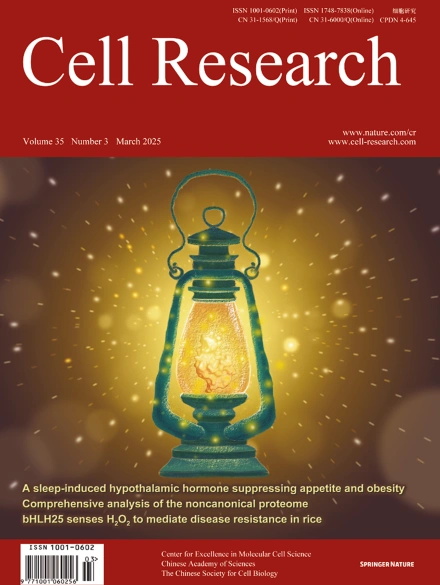
Advanced Search
Submit Manuscript
Advanced Search
Submit Manuscript
Volume 35, No 3, Mar 2025
ISSN: 1001-0602
EISSN: 1748-7838 2018
impact factor 17.848*
(Clarivate Analytics, 2019)
Volume 35 Issue 3, March 2025: 165-185 |
Raptin, a sleep-induced hypothalamic hormone, suppresses appetite and obesity
Ling-Qi Xie1,† , Biao Hu1,† , Ren-Bin Lu1 , Ya-Lun Cheng1 , Xin Chen1 , Jie Wen1 , Yao Xiao1 , Yu-Ze An1 , Ning Peng1 , Yu Dai1 , Genqing Xie2 , Qi Guo1 , Hui Peng1,* , Xiang-Hang Luo1,3,4,5,*
1Department of Endocrinology, Endocrinology Research Center, Xiangya Hospital of Central South University, Changsha, Hunan, ChinaSleep deficiency is associated with obesity, but the mechanisms underlying this connection remain unclear. Here, we identify a sleep-inducible hypothalamic protein hormone in humans and mice that suppresses obesity. This hormone is cleaved from reticulocalbin-2 (RCN2), and we name it Raptin. Raptin release is timed by the circuit from vasopressin-expressing neurons in the suprachiasmatic nucleus to RCN2-positive neurons in the paraventricular nucleus. Raptin levels peak during sleep, which is blunted by sleep deficiency. Raptin binds to glutamate metabotropic receptor 3 (GRM3) in neurons of the hypothalamus and stomach to inhibit appetite and gastric emptying, respectively. Raptin-GRM3 signaling mediates anorexigenic effects via PI3K-AKT signaling. Of note, we verify the connections between deficiencies in the sleeping state, impaired Raptin release, and obesity in patients with sleep deficiency. Moreover, humans carrying an RCN2 nonsense variant present with night eating syndrome and obesity. These data define a unique hormone that suppresses food intake and prevents obesity.
https://doi.org/10.1038/s41422-025-01078-8